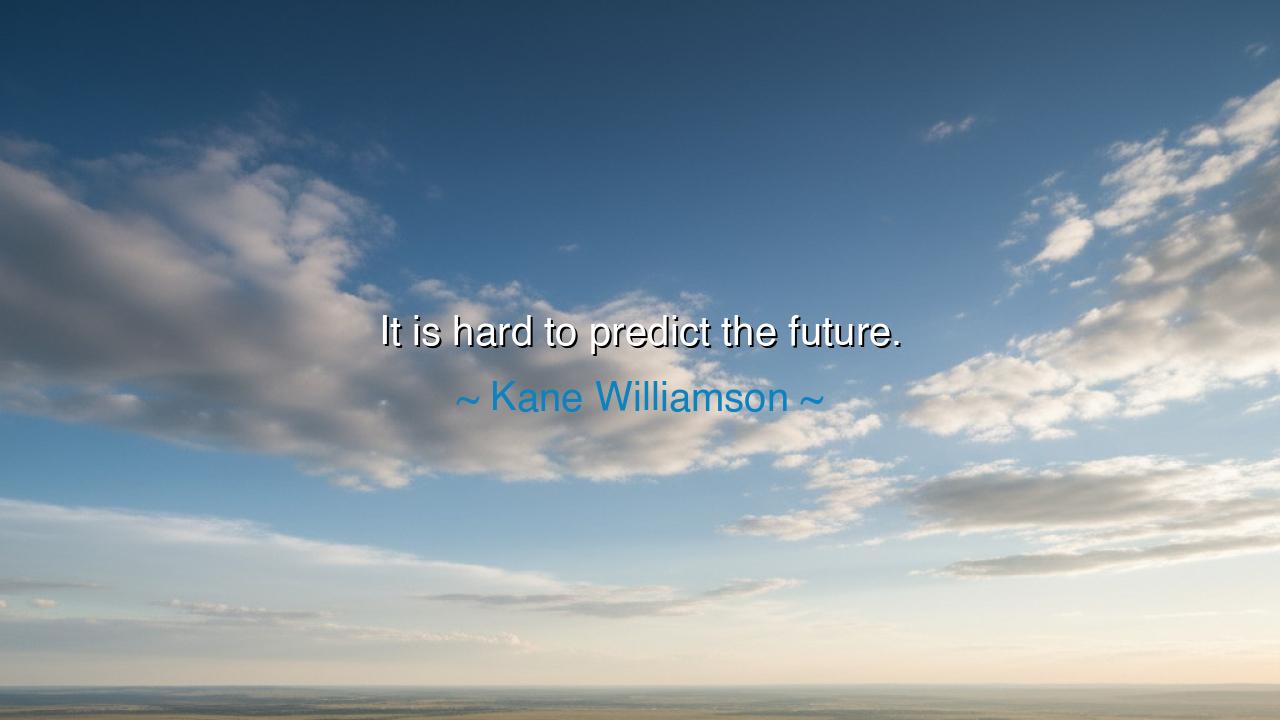
It is hard to predict the future.






"It is hard to predict the future." These words, spoken by Kane Williamson, speak to the fundamental uncertainty that governs all of human existence. In this simple truth lies the acknowledgment that no matter how carefully we plan, how much knowledge we accumulate, or how certain we are of our abilities, the future remains an elusive and mysterious force. It is impossible to foresee all the challenges, opportunities, and changes that lie ahead. Despite our best efforts to predict, the future is often shaped by forces far beyond our control—be they circumstances, choices, or the unpredictable nature of life itself.
In the ancient world, this uncertainty was recognized by philosophers who grappled with the nature of fate and free will. Heraclitus, the Greek philosopher, famously said, "The only constant in life is change." In this simple declaration, he acknowledged the fluidity of existence and the impossibility of predicting the future. The world, he believed, was in a perpetual state of flux, and to attempt to predict what would happen next was to ignore the essential nature of life itself. Williamson's reflection on the difficulty of predicting the future echoes this ancient truth: the future is not something we can control, and it is shaped by forces beyond our comprehension.
The ancient Stoic philosophers, such as Seneca and Marcus Aurelius, also recognized the uncertainty of the future and taught that the best way to live was not by trying to control or predict what was to come, but by focusing on what we can control in the present. Marcus Aurelius often wrote in his Meditations about the importance of accepting the unknown and making peace with the unpredictability of life. For the Stoics, wisdom came not from trying to foresee the future, but from cultivating inner strength and resilience in the face of whatever life might bring. In Williamson’s words, we hear a modern reflection of this ancient wisdom: that the key to living well is not in predicting the future, but in adapting to it as it unfolds.
One of the most powerful examples of this lesson comes from the life of Julius Caesar. Despite his brilliance as a general and strategist, Caesar understood that no matter how much he planned, the future was ultimately beyond his control. This understanding is reflected in his famous saying, "I came, I saw, I conquered," which captures the essence of adapting to the present moment. Caesar did not dwell on the uncertainties of the future; he acted decisively in the present, understanding that the future would only reveal itself as events unfolded. Kane Williamson's statement similarly calls us to focus on what we can control—our efforts, our decisions, and our actions in the present, rather than trying to predict or control what lies ahead.
The lesson we take from Williamson’s words is that, while it is natural to want to predict and plan for the future, we must also cultivate the ability to adapt and embrace uncertainty. The future is a blank canvas, and while we can set our course, we cannot always predict the winds that will carry us. Instead of seeking to control the future, we must learn to live fully in the present, taking the actions that align with our values and goals, but with the humility to understand that we do not control what lies ahead.
In our own lives, we can take practical steps to embrace the uncertainty of the future. Instead of becoming anxious about what might happen, we should focus on the actions we can take today to build a life that aligns with our values and purpose. Whether in our careers, our relationships, or our personal growth, we should prioritize living in the moment and making decisions that reflect the best of who we are, while remaining open to the changes that the future will undoubtedly bring. Like Marcus Aurelius, we must remember that we are not responsible for the future, but only for how we respond to it.
Let us not be afraid of the uncertainty of the future, but rather embrace it with the courage to act in the present. The future is not promised to us, and it is in the choices we make today that we create the path for tomorrow. As Kane Williamson reminds us, the future is unpredictable, but our actions in the present can guide us toward the future we desire. So, let us live with intention, adaptability, and a heart open to the journey that unfolds before us.






AAdministratorAdministrator
Welcome, honored guests. Please leave a comment, we will respond soon